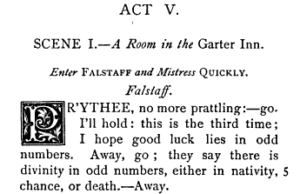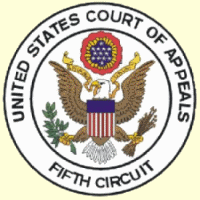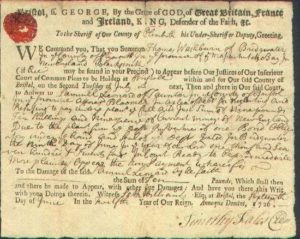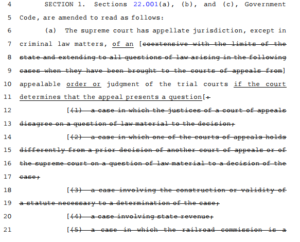 Recent decisions have grappled with whether a “memorandum of decision” qualifies as a final judgment for purposes of starting appellate deadlines; the recent case of In re RKK further contributes to that dicsussion, finding that the trial court’s memorandum in that case did start the clock. No. 05-17-00794-CV (Oct. 25, 2017) (mem. op.)
Recent decisions have grappled with whether a “memorandum of decision” qualifies as a final judgment for purposes of starting appellate deadlines; the recent case of In re RKK further contributes to that dicsussion, finding that the trial court’s memorandum in that case did start the clock. No. 05-17-00794-CV (Oct. 25, 2017) (mem. op.)
Monthly Archives: October 2017
In an uncommon but fundamental challenge to an arbitration agreement, the plaintiff relied upon his inability to understand English. The Fifth Court rejected this challenge under general principles of contract formation:
“It is unusual that MiCocina translated the Mutual Agreement to Arbitrate, summary plan description, and handbook into Spanish, but not the one-page Acknowledgment form. However, on this record, there is no evidence of a fraudulent misrepresentation or trickery that would relieve Balderas of the consequences of failing to read or have read to him a document he voluntarily signed. In light of the obligation an illiterate party has to have a document read to them before they sign it and the lack of evidence of a fraudulent misrepresentation or trickery, we conclude Balderas is bound by his signature on the Acknowledgment. Accordingly, Balderas failed to prove procedural unconscionability and fraudulent inducement.”
MiCocina v. Balderas, No. 05-16-01507-CV (Oct. 27, 2017) (mem. op.) (citations omitted; distinguishing Delfingen US-Texas, LP v. Valenzuela, 407 S.W.3d 791
(Tex. App.—El Paso 2013, no pet.)).T
 B.C. v. Steak & Shake involved a late-filed summary judgment response. The unsuccessful appellant sought rehearing en banc, which led to another opinion. Among other matters, the Court declined to consider a “supplemental clerk’s record” containing information about the logistics of the filing, when that material was not before the trial court or the Fifth Court at the time of its opinion. The Court quoted Chief Justice Hecht’s statement on the general subject in Worthy v. Collagen Corp., 967 S.W.2d 360, 366 Tex. 1998): “Supplementation of the record after a case is decided is a different matter. It certainly does not serve judicial economy for the appellate court to allow a supplementation of the record that would require it to reconsider its decision on the merits when the party has had ample opportunity to correct the omission prior to decision.” 967 S.W.2d 360, 366 (Tex. 1988). No. 05-14-00649-CV (Oct. 27, 2017) (suppl. op. on rehearing).
B.C. v. Steak & Shake involved a late-filed summary judgment response. The unsuccessful appellant sought rehearing en banc, which led to another opinion. Among other matters, the Court declined to consider a “supplemental clerk’s record” containing information about the logistics of the filing, when that material was not before the trial court or the Fifth Court at the time of its opinion. The Court quoted Chief Justice Hecht’s statement on the general subject in Worthy v. Collagen Corp., 967 S.W.2d 360, 366 Tex. 1998): “Supplementation of the record after a case is decided is a different matter. It certainly does not serve judicial economy for the appellate court to allow a supplementation of the record that would require it to reconsider its decision on the merits when the party has had ample opportunity to correct the omission prior to decision.” 967 S.W.2d 360, 366 (Tex. 1988). No. 05-14-00649-CV (Oct. 27, 2017) (suppl. op. on rehearing).
 Of interest to all appellate practitioners, particularly those who may be planning on becoming board certified – the Fifth Circuit describes its newly-created Pro Bono Program as follows. Great opportunity for quality appellate experience!
Of interest to all appellate practitioners, particularly those who may be planning on becoming board certified – the Fifth Circuit describes its newly-created Pro Bono Program as follows. Great opportunity for quality appellate experience!
“The Program assists the Court by facilitating the appointment of pro bono counsel to represent pro se litigants. Pro Bono Panel members will, at the Court’s invitation, be appointed in civil appeals that, for example, present issues of first impression, complex facts or legal questions, or potentially meritorious claims warranting further briefing and/or oral argument.
Pro bono appointments are made by the Court, and are limited to proceedings before this Court. Although oral argument is not guaranteed, cases selected for the Program are likely to meet the Court’s criteria for granting oral argument.
Attorneys wishing to join the Pro Bono Panel should submit to the CMJS Office a cover letter (including statement of types of cases, if any, that counsel prefers or does not prefer), resumé, writing sample (appellate brief or brief of substantive motion), and statement of good standing in the Fifth Circuit Bar. Applications for panel membership should be emailed to the CMJS Office at probono@ca5.uscourts.gov. Questions about the program may be directed to Kate Clark, Administrative Attorney, at that email address or by telephone at 504-310-7799.”
 Over the summer, the Fifth Court thoroughly summarized and applied the many recent Supreme Court (both U.S. and Texas) cases about personal jurisdiction in Northern Frac Proppants v. 2011 NF Holdings. Specifically, “this appeal presents this central specific jurisdiction question: Do non-Texas residents who acquire and sell Wisconsin sand mines and related rights purposefully avail themselves of Texas if (i) Texas companies claim to be the assets’ rightful owners and (ii) the non-residents know that much of the sand produced in Wisconsin will be sold to customers for use in Texas fracing operations?” The Court “conclude[d] that the answer is no based on this case’s particular facts.” No. 05-16-00319-CV (July 27, 2017) (mem. op.)
Over the summer, the Fifth Court thoroughly summarized and applied the many recent Supreme Court (both U.S. and Texas) cases about personal jurisdiction in Northern Frac Proppants v. 2011 NF Holdings. Specifically, “this appeal presents this central specific jurisdiction question: Do non-Texas residents who acquire and sell Wisconsin sand mines and related rights purposefully avail themselves of Texas if (i) Texas companies claim to be the assets’ rightful owners and (ii) the non-residents know that much of the sand produced in Wisconsin will be sold to customers for use in Texas fracing operations?” The Court “conclude[d] that the answer is no based on this case’s particular facts.” No. 05-16-00319-CV (July 27, 2017) (mem. op.)
 Applying In re: Jorden, 249 S.W.3d 416 (Tex. 2008), which held that a Rule 202 pre-suit deposition was inappropriate in a health care case before service of the appropriate expert report, the Fifth Court held in In re Sandate that third-party discovery was improper for similar reasons, and granted a mandamus petitition to quash it. No. 05-17-00871-CV (Oct. 19, 2017).
Applying In re: Jorden, 249 S.W.3d 416 (Tex. 2008), which held that a Rule 202 pre-suit deposition was inappropriate in a health care case before service of the appropriate expert report, the Fifth Court held in In re Sandate that third-party discovery was improper for similar reasons, and granted a mandamus petitition to quash it. No. 05-17-00871-CV (Oct. 19, 2017).
While Sandate does not directly address the requirement of a lack of adequate remedy by direct appeal, Jorden makes clear that this line of authority is not intended as a general invitation to seek mandamus relief about discovery matters:
Correcting whichever view is wrong after final judgment seems very unlikely, as it is hard to imagine how allowing discovery a little too early could ever be harmful error — either by causing rendition of an improper judgment or preventing the presentation of an appeal. If (as relators claim) Texas law prohibits presuit depositions until an expert report is served, those depositions cannot be “untaken” and thus an appellate court will not be able to cure the error and enforce the statutory scheme after trial. As a result, relators unquestionably may lose substantive and procedural rights if review is postponed, rights the Legislature believed (as discussed below) are critical to ensuring access to affordable medical care in the state.
Sandate does, however, contain a muscular summary of when mandamus relief may issue to address a trial court’s legal error:
In civil cases, “[a] trial or appellate court has no discretion in determining what the law is or inapplying the law to the facts, even if the law is somewhat unsettled.” [Jorden, 249 S.W.3d] at 424 (citing In re Prudential Ins. Co. of Am., 148 S.W.3d 124, 135–36 (Tex. 2004) (orig. proceeding) (case of first impression regarding enforceability of contractual jury waiver); see also Lunsford v. Morris, 746 S.W.2d 471, 473 (Tex. 1988) (orig. proceeding) (changing 100 years of case law and granting mandamus for abuse of discretion when trial judge followed then-existing law), disapproved on other grounds by Walker v. Packer, 827 S.W.2d 833 (Tex. 1992) (orig. proceeding).
 In re Guess provides a basic reminder about the limits of pro se representation and legal services from non-lawyers: “Before the Court is relator’s October 5, 2017 petition for writ of mandamus. Bruce Bryant filed this petition for writ of mandamus as relator’s “authorized representative.” Mr Bryant is not an attorney, is not a party to the litigation and, therefore, cannot file a petition on behalf of relator.” Nos. 05-17-01163-CV et seq. (Oct. 11, 2017) (mem. op.)
In re Guess provides a basic reminder about the limits of pro se representation and legal services from non-lawyers: “Before the Court is relator’s October 5, 2017 petition for writ of mandamus. Bruce Bryant filed this petition for writ of mandamus as relator’s “authorized representative.” Mr Bryant is not an attorney, is not a party to the litigation and, therefore, cannot file a petition on behalf of relator.” Nos. 05-17-01163-CV et seq. (Oct. 11, 2017) (mem. op.)
 The Fifht Court granted mandamus relief against a lawsuit about a student’s discipline by a private school, based on the ecclesiastical abstention doctrine. The Court’s thorough analysis observes: “We acknowledge that the dispute does not expressly concern religious doctrine in all respects. But we also note that [In re: St. Thomas High School, 495 S.W.3d 500, 506 (Tex. App.—Houston [14th Dist.] 2016, orig. proceeding). and [In re: Vida, No. 04-14-00636-CV, 2015 WL 82717, at *2 (Tex. App.—San Antonio Jan. 7, 2015, orig.
The Fifht Court granted mandamus relief against a lawsuit about a student’s discipline by a private school, based on the ecclesiastical abstention doctrine. The Court’s thorough analysis observes: “We acknowledge that the dispute does not expressly concern religious doctrine in all respects. But we also note that [In re: St. Thomas High School, 495 S.W.3d 500, 506 (Tex. App.—Houston [14th Dist.] 2016, orig. proceeding). and [In re: Vida, No. 04-14-00636-CV, 2015 WL 82717, at *2 (Tex. App.—San Antonio Jan. 7, 2015, orig.
proceeding) (mem. op.)] did not do so either. St. Thomas involved the expulsion of a student based on the school handbook. Vida concerned age requirements in the school’s policy manual. And as the St. Thomas court observed, ‘exclusive focus on the presence or absence of an express dispute concerning religious doctrine demonstrates an unduly narrow conception of [the doctrine’s] applicable protections.'” In re Episcopal School of Dallas, No. 05-17-00493-CV (Oct. 11, 2017). The opinion also reviews and rejects a challenge to the mandamus petition based on the doctrine of laches.
 Chase Bank sued a borrower; the threshold question was whether the longer limitations period for a negotiable instrument applied. While Chase sued on a note, the instrument did not qualify as a negotiable instrument because ” the sum-certain requirement is not met unless one can determine from the face of the note the extent of the maker’s liability.” Here, the Note (1) referred to a promise to pay “the total principal amount of $169,573.72 or so much as may be outstanding,” (2) “permit to pay ‘all or any part of the loan evidenced by this Note at any time,'” (3) said that “if prepayments are made, the Bank may apply them “in such order and manner as [the Bank] may from time to time determine in its sole discretion,'” and (4) referred to the “books and records of the Bank” to specify the precise amount owerd. Accordingly: “[b]ecause the Note fails to identify a sum certain on its face, we conclude it is not a negotiable instrument.” JP Morgan Chase v. Robinson & Hoskins, No. 05-17-00087-CV (Oct. 9, 2017) (mem. op.)
Chase Bank sued a borrower; the threshold question was whether the longer limitations period for a negotiable instrument applied. While Chase sued on a note, the instrument did not qualify as a negotiable instrument because ” the sum-certain requirement is not met unless one can determine from the face of the note the extent of the maker’s liability.” Here, the Note (1) referred to a promise to pay “the total principal amount of $169,573.72 or so much as may be outstanding,” (2) “permit to pay ‘all or any part of the loan evidenced by this Note at any time,'” (3) said that “if prepayments are made, the Bank may apply them “in such order and manner as [the Bank] may from time to time determine in its sole discretion,'” and (4) referred to the “books and records of the Bank” to specify the precise amount owerd. Accordingly: “[b]ecause the Note fails to identify a sum certain on its face, we conclude it is not a negotiable instrument.” JP Morgan Chase v. Robinson & Hoskins, No. 05-17-00087-CV (Oct. 9, 2017) (mem. op.)
 Brooks sued CalAtlantic about the construction of a retaining wall; CalAtlantic argued that the suit was barred by the 10-year statute of repose in Tex. Civ. Prac. & Rem. Code § 16.069. The Fifth Court affirmed summary judgment for the defense. Procedurally, the Court concluded that the plaintiff had the burden to establish an exception to the statute once the defendant showed its applicability, citing Ryland Group v. Hood, 924 S.W.2d 120 (Tex, 1996). Substantively, the Court distinguished plaintiff’s authority, observingL “[T]here is no evidence of [defendant’s] awareness that deviating from the Civil Plans could create property defects and dangerous conditions. And neither [cited case] supports Brooks’s contention that proof of deviation from construction plans, alone, is evidence of willful misconduct.” Brooks v. CalAtlantic Homes of Texas, No. 05-16-01203-CV (Oct. 9, 2017) (mem. op.)
Brooks sued CalAtlantic about the construction of a retaining wall; CalAtlantic argued that the suit was barred by the 10-year statute of repose in Tex. Civ. Prac. & Rem. Code § 16.069. The Fifth Court affirmed summary judgment for the defense. Procedurally, the Court concluded that the plaintiff had the burden to establish an exception to the statute once the defendant showed its applicability, citing Ryland Group v. Hood, 924 S.W.2d 120 (Tex, 1996). Substantively, the Court distinguished plaintiff’s authority, observingL “[T]here is no evidence of [defendant’s] awareness that deviating from the Civil Plans could create property defects and dangerous conditions. And neither [cited case] supports Brooks’s contention that proof of deviation from construction plans, alone, is evidence of willful misconduct.” Brooks v. CalAtlantic Homes of Texas, No. 05-16-01203-CV (Oct. 9, 2017) (mem. op.)
 Today’s Dallas Observer has an excellent story about the City of Dallas’s $4 billion back pay dispute with police and firefighters, part of which is set for trial in December 2017 in Collin County. The case involves issues addressed by the Fifth Court in 2002 (yes, 2002) in Arredondo v. City of Dallas, 79 S.W.3d 65 (Tex. App.–Dallas 2002, pet. denied). Specifically, the Court found the word “maintained” to be patently ambiguous as used in this part of a 1978 ordinance: “The current percentage pay differential between grades in the sworn ranks of the Dallas Police Force and the Fire Fighter and Rescue Force shall be maintained.”
Today’s Dallas Observer has an excellent story about the City of Dallas’s $4 billion back pay dispute with police and firefighters, part of which is set for trial in December 2017 in Collin County. The case involves issues addressed by the Fifth Court in 2002 (yes, 2002) in Arredondo v. City of Dallas, 79 S.W.3d 65 (Tex. App.–Dallas 2002, pet. denied). Specifically, the Court found the word “maintained” to be patently ambiguous as used in this part of a 1978 ordinance: “The current percentage pay differential between grades in the sworn ranks of the Dallas Police Force and the Fire Fighter and Rescue Force shall be maintained.”
 Defendant challenged plaintiff’s standing in a dispute about nursing home care, arguing: “The plaintiff must be personally injured—he must plead facts demonstrating that he, himself (rather than a third party or the public at large), suffered the injury.” The Fifth Court agreed, focusing on the pleading at the time of the summary judgment hearing: “Patricia and Delois’s original petition was their pleading on file at the time of the hearing. The original petition does not allege the individual injuries Patricia claims on appeal. Although the prayer in the petition requests that a judgment include $5,000 for “Patricia A. Shaw—Agent Fee’s” [sic] and $39,000 for “Home Health Care[,]” the claims in the original petition concern the economic and physical injuries that Delois suffered. Because Patricia did not plead her individual claims in the original petition, she may not now urge these claims and supporting arguments on appeal.” Shaw v. Daybreak, Inc., No. 05-16-01251-CV (Sept. 20, 2017).
Defendant challenged plaintiff’s standing in a dispute about nursing home care, arguing: “The plaintiff must be personally injured—he must plead facts demonstrating that he, himself (rather than a third party or the public at large), suffered the injury.” The Fifth Court agreed, focusing on the pleading at the time of the summary judgment hearing: “Patricia and Delois’s original petition was their pleading on file at the time of the hearing. The original petition does not allege the individual injuries Patricia claims on appeal. Although the prayer in the petition requests that a judgment include $5,000 for “Patricia A. Shaw—Agent Fee’s” [sic] and $39,000 for “Home Health Care[,]” the claims in the original petition concern the economic and physical injuries that Delois suffered. Because Patricia did not plead her individual claims in the original petition, she may not now urge these claims and supporting arguments on appeal.” Shaw v. Daybreak, Inc., No. 05-16-01251-CV (Sept. 20, 2017).
My partner Britta Stanton recently published a good article – “Who’s Your Client? The Business or the Executive?”‘ about the importance of quality Upjohn warnings – worth a read if your practice involves the depositions of company executives.
 Arising from what the Fifth Court described as a “motion [that] has been pending for nearly five years without ruling,” it found that “[t]he trial court has had more than a reasonable time to rule, and relator has done what is require to obtain a ruling on the motion.” Accordingly, it granted mandamus relief, observing that “[a]mong the criteria included are the trial court’s actual knowledge of the motion, its overt refusal to act, the state of the court’s docket, and the existence of other judicial and administrative matters which must be addressed first.” Also, while the petitioner asked the the trial court not only consider his motion to reconsider but also direct that it be granted, the Court observed: “We deny that request because, while we have jurisdiction to direct the trial court to exercise its discretion, we are not permitted to tell the trial court how to rule on the motion.” In re Owens, No. 05-17-00919-CV (Sept. 25, 2017) (mem. op.)
Arising from what the Fifth Court described as a “motion [that] has been pending for nearly five years without ruling,” it found that “[t]he trial court has had more than a reasonable time to rule, and relator has done what is require to obtain a ruling on the motion.” Accordingly, it granted mandamus relief, observing that “[a]mong the criteria included are the trial court’s actual knowledge of the motion, its overt refusal to act, the state of the court’s docket, and the existence of other judicial and administrative matters which must be addressed first.” Also, while the petitioner asked the the trial court not only consider his motion to reconsider but also direct that it be granted, the Court observed: “We deny that request because, while we have jurisdiction to direct the trial court to exercise its discretion, we are not permitted to tell the trial court how to rule on the motion.” In re Owens, No. 05-17-00919-CV (Sept. 25, 2017) (mem. op.)
 At issue in Galaxy Builers, Ltd. v. Globus Management Group was a trial court order denying enforcemement of an arbitrator’s subpoena. While the order said that it was
At issue in Galaxy Builers, Ltd. v. Globus Management Group was a trial court order denying enforcemement of an arbitrator’s subpoena. While the order said that it was  final, section 171.098 of the Texas Arbitration Act does not list it as an appealable category of arbitration-related ruling; thus, the appeal was dismissed for lack of jurisdiction. No. 05-17-00831-CV (Oct. 2, 2017) (mem. op.)
final, section 171.098 of the Texas Arbitration Act does not list it as an appealable category of arbitration-related ruling; thus, the appeal was dismissed for lack of jurisdiction. No. 05-17-00831-CV (Oct. 2, 2017) (mem. op.)
